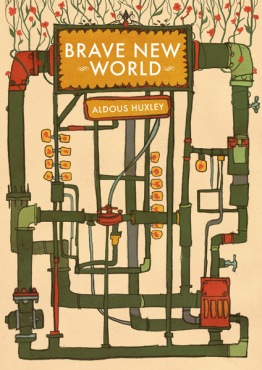But I don’t want comfort. I want God, I want poetry, I want real danger, I want freedom, I want goodness. I want sin.
Even though I finished this book on Thursday, I’ve been either too busy or too lazy to write the review. Brave New World has been on my list for a terribly long time, but I’ve finally emerged from the darkness, joined most twelfth graders from around the world, and read this all-time classic.
If you’re living under the same rock I just emerged from and haven’t yet read Brave New World, then here is a rough, back-cover summary. Written in the 30’s, Brave New World is set in the future in 632 A.F., After Ford ( or 2540 A.D.) in London. In this world resources and reproduction are carefully controlled; the tradition of the family unit has been disposed, and instead people are created in “hatcheries.” Biological makeup is also controlled to create separate castes of people of different abilities. The lack of familial relationships causes the society to promote sexual relationships to the extent that polyamory is completely normal, and monogamy is non-existent. The modern society is based on the demands of materialism and consumption. You must consume and consume more; don’t fix what you break, just buy another – the true Henry Ford way. The novel follows characters Lenina and Bernard (of the higher castes) and their journey from London to North America to the “reservations,” places in the world where religious, traditional family-based cultures still exist but considered barbaric and savages. During their visit, they meet John, a savage born of a woman from their society who accidentally got pregnant while she was there, and was deprived of the means to have an abortion. John and his mother Linda travel back with Lenina and Bernard to London. And as you can imagine worlds collide.
I find it really hard to critique A Brave New World mostly because of its age and my lack of knowledge about utopian/dystopian literature. What I would rise to criticize in this novel if it were published today – for example the attitude towards “savagery”- are obviously products of its time. In fact I found that I read this book more as a history student and less as an English student. What I understand of the 1930’s, particularly in Europe, really reflects in Huxley’s writing, particularly the caste system and the idea of “purer” genetic makeup and identity vs. others.
I’ve never read any H.G. Wells, nor any other founding writer of utopian/dystopian literature (see I can’t even name any others), but I still was personally impressed by how Huxley was able to create an entire world in so few pages. If you look for the genre in the shelves of bookstores today, you’ll find The Hunger Games and Divergent and other novels that far exceed the length of a Brave New World. While A Brave New World may not have the colour and as scintilating romance of The Hunger Games, I think it made me think more. On a philosophical level, this novel really blew me away. And I really liked too how many lines stuck with me — that’s always a good indication for me of good writing. I find myself walking down the street and suddenly whispering: “I am claiming the right to be unhappy.” I like that. A lot.
My roommate Marta actually picked out Brave New World for me to read, thus liberating me from that pit of ignorance (thank you Marta! ;)). Let me tell you that Marta has the most beautiful Milanese Italian accent, and so much like that Milanese fashion, she read it with absolute efficiency and class. I watched her depart today, and as I type this now I look across the room and see her bed empty… At least there are more books to be read.
Books Read: 3


Reblogged this on a love for words and commented:
Book #3 for my book marathon with YEG Bookstravaganza! Take a look and don’t forget to donate for Edmonton Public Library’s Welcome Baby initiative!